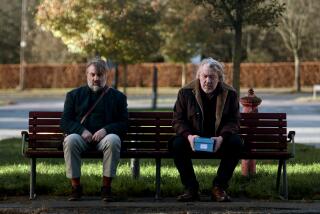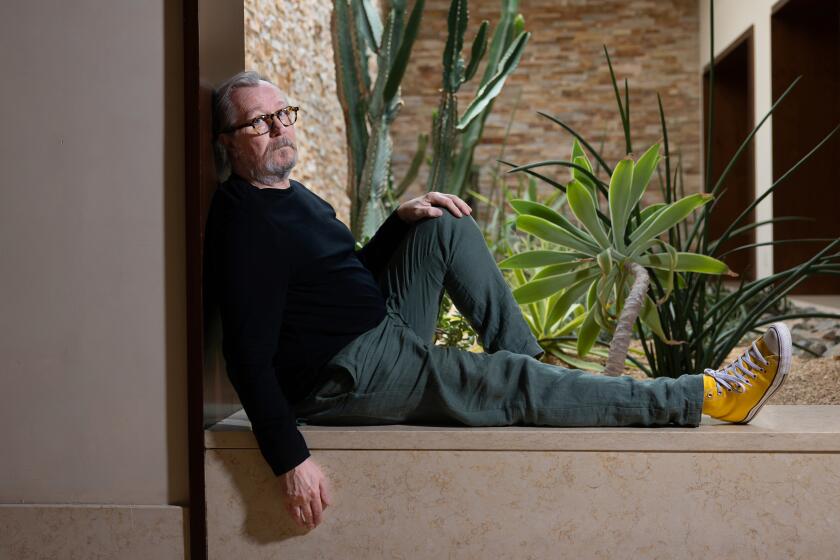Oscar-nominated live-action short films capture dark moments of the past and sparks of the imagination
Want to see five of the best Oscar-nominated films this year in less than two hours? Catch the Short Film (Live Action) entries at Nuart Theatre by Feb. 22, showcasing talent from around the globe.
As a student at UCLA, Reed Van Dyk wrote and directed the heart-stopping “DeKalb Elementary,” based on a real 911 call recorded during a school shooting lockdown. Van Dyk was researching another project when he found the call online. “I kept having to pause it because I would become overwhelmed,” he says. “By the time it was over, I was sort of wrecked and so moved by what had happened, and saddened by this being a very common scene in American life.”
WATCH: Video Q&A’s from this season’s hottest contenders »
Another haunting entry is “My Nephew Emmett,” by Kevin Wilson Jr. His NYU student film centers on the days surrounding 14-year-old Emmett Till’s racially charged abduction from his great uncle Moses Wright’s home in Mississippi in 1955. In making the film, Wilson kept the focus on Wright, who was threatened by the abductors. “Having to make that decision whether to give up the child you’re responsible for, or have your entire family massacred. That was an impossible decision that he had to make.”
The two men charged with Till’s murder were acquitted, making the film all too relevant. “This is about a kid being killed and no one being held accountable for it,” Wilson says.
“Watu Wote/All of Us,” a German student film directed by Katja Benrath and produced by Tobias Rosen, also re-creates a real event. In 2015, the terrorist group Al Shabaab hijacked a bus in Kenya and demanded that the Muslim passengers identify the Christians or face death. When Benrath and Rosen read about what took place, “it touched us so deeply, and we had the feeling that this is universal,” Benrath says, speaking via Skype from Hamburg. “It’s very important that people know that you can stand up for each other and that Muslims are not terrorists.”
She premiered the film in Kenya the day the nominations were announced, “because the cast and crew there were 95% of our team.” When “Watu Wote” was named, “everyone in the cinema was screaming.”
Rachel Shenton, a British actress whose father had become profoundly deaf overnight, has long campaigned on behalf of deaf people. Most hearing parents of deaf children don’t learn sign language, and most deaf children have no specialist support in school. She wrote “The Silent Child” and her fiancé, actor-producer Chris Overton, directed it. The film stars 5-year-old Maisie Sly, who is deaf, as a girl whose middle-class family doesn’t much notice her. Shenton plays her social worker.
“There’s so much talk about diversity at the moment, but disability should be included in the conversation,” says Overton, reached by Skype in London. “Silent Child” is the first Oscar-nominated film to star an actor with a disability since 1986’s “Children of a Lesser God.”
The only comedy in the lineup, “The Eleven O’Clock,” comes from Australian director Derin Seale and his close friends, actors Josh Lawson and Damon Herriman. “It wasn’t set up to lead to anything particular at the time,” Seale says, speaking from a set in New Zealand. “We wanted to do something that was fun to make.” Lawson adapted a play he had written about a psychiatrist who meets with a patient who believes he’s the psychiatrist, and it’s unclear which is which.
“You don’t really think of Oscar nominations and comedy in the same sentence, so I’m not surprised that there was only one,” says Seale. “Although I was surprised that it was ours.”
The nominations quickly affected the filmmakers’ lives. “Everything that I’ve ever dreamed of is starting to happen,” says Wilson. He’s directing his first feature, a socially conscious revenge thriller, this summer. Benrath is prepping her first feature in Germany. Several have found representation. Overton and Shenton plan to adapt their film into either a feature or drama series. “Everyone’s saying, ‘You’ve got to get it ready for the Oscars,’ but we can’t just rush something like this,” he says. “The message is far too important.”
Those who attended the nominee luncheon speak of it reverently. Says Benrath, “I talked to Meryl Streep and I said, ‘Thank you for existing because without you I wouldn’t be nominated today.’ She was everything I thought she would be.”
For Van Dyk, just being in the same room with his idol, director Paul Thomas Anderson, was surreal. Wilson managed to speak with Steven Spielberg, all the while thinking, “Wow, I’m done. This is all I needed right here.”
More to Read
From the Oscars to the Emmys.
Get the Envelope newsletter for exclusive awards season coverage, behind-the-scenes stories from the Envelope podcast and columnist Glenn Whipp’s must-read analysis.
You may occasionally receive promotional content from the Los Angeles Times.






